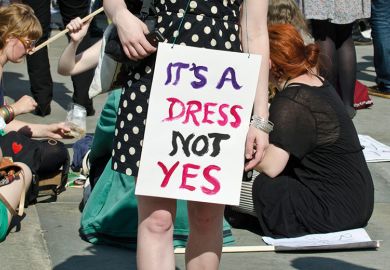We need a dramatic increase in the level of reporting of sexual violence at universities.
It was the National Union of Students’ Hidden Marks report that first gave visibility to the problem of sexual violence on UK campuses. Of the more than 2,000 women surveyed for the 2010 study, one in seven said that they had suffered a serious physical or sexual assault while a student, and two-thirds had experienced incidents of sexual harassment, such as groping, flashing or unwanted sexual comments.
NUS and student activists have worked hard to ensure that this issue remains firmly on the agenda of university communities. Last October’s Changing the Culture report by Universities UK has now been followed by UUK’s publication of case studies last week that detail good policies and practices used at UK universities to tackle sexual violence.
One test of any university policy, however, must be the extent to which it empowers survivor/victims.
In practice, this means having a confidential reporting procedure specifically for sexual violence. The reporting student should have control over the process throughout, such as the power to decide whether or not to report to the police.
If university communities, in our view misguidedly, choose to take that right away from victim/survivors, it will most likely result in much lower reporting rates with significant consequences for students.
This will also mean that university communities have even fewer opportunities to support the physical and mental health needs of reporting students. That would be a failure of university communities in the duty of care to students.
If we are to successfully empower victim/survivors, then as university communities we should respect the leadership of the victim/survivor in driving a process that we support.
Policies and practices also need to contribute to prevention.
Students’ unions have predominantly taken the lead in the fight against sexual harassment. Good examples of their work on this issue include the University of Manchester Students’ Union’s “We Get It!” campaign and the University of East Anglia Students’ Union’s “Never OK” programme, which aimed to increase the visibility of reporting procedures.
If reporting also becomes the new norm, this is likely to deter some perpetrators.
Many students’ unions have also helpfully chosen to train their bar staff, through efforts such as the “Good Night Out Campaigns”, so that staff can accurately identify potentially abusive behaviour and intervene to stop it or report it to those more qualified to step in.
It is, however, down to the entire university communities to work together in tackling sexual violence.
While there is often much commitment from students to deliver consent workshops for new students, there is a need for professional staff to ensure that there is adequate support in place for those delivering such training.
This means an investment of financial resources. At Durham University, there is a full-time member of staff who specialises in the area of tackling sexual violence on campus – this is an innovation that could helpfully be applied across the sector.
University communities need, we would argue, to go well beyond simply widely promoting reporting procedures.
There needs to be, for instance, more focus on the health needs of the survivor/victim – both physical and mental.
Access to confidential counselling services and academic student support services, such as the securing of any necessary extensions to deadlines and the possibility of suspending studies if need be, are important to have in place.
University communities have the opportunity to contribute to the prevention of sexual violence and to improve the chances of all students by fulfilling their full educational potential.
A radical increase in reporting rates will be the first sign that students trust their university communities in actively tackling sexual violence.
Hareem Ghani is the women’s officer for the National Union of Students. Graham Towl is a professor of forensic psychology, and was formerly pro vice-chancellor chair of the Sexual Violence Task Force, at Durham University.
Register to continue
Why register?
- Registration is free and only takes a moment
- Once registered, you can read 3 articles a month
- Sign up for our newsletter
Subscribe
Or subscribe for unlimited access to:
- Unlimited access to news, views, insights & reviews
- Digital editions
- Digital access to THE’s university and college rankings analysis
Already registered or a current subscriber?








